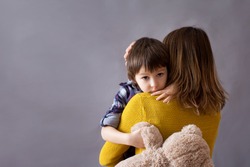
Traits, tips, and advantages of a highly-sensitive child? Pleasantly surprising is that current research findings are backing society’s philosophical shift toward a kinder perspective that embraces, rather than traditionally rejects, the highly-sensitive personality. Some experts are even touting the highly-sensitive brain as often having a relationship to giftedness; in fact, many of these people are identified as “gifted”. Below are 12 characteristics for identifying a ‘highly-sensitive person’, as established by the psychologist, Elaine Aron. This is also important for understanding and ultimately appreciating why they react to or do things differently (not “wrongly”). Also included below are tips not only about how best to support your highly-sensitive child but also, about how to cultivate and capitalize on the rare advantages possessed by approximately one in every five children!
— IDENTIFY a “Highly-Sensitive” Child, or Person: Traits 1-12

- Extremely Observant: This is the child or person who will tell you later, for example, who had whitened their teeth, identifying the change in someone’s appearance that you couldn’t put your finger on.
- Empathic: Beyond feeling sympathy or compassion, this child or person genuinely (and sometimes, unconsciously) experiences what other people are feeling, or others’ moods – without even trying to.
- Intense: Deeply troubling emotions, such as anger or worry, fade slowly.
- Easily, physically discomforted: For instance, they will express that unpleasant textures and ill-fitting clothing are disruptive to them.
- Easily overstimulated: For them, there is a much lower toleration threshold for too much noise and too many people, for too long, and this causes stress and fatigue.
- Careful and deliberately paced: Simply put, they hate to be rushed!
- Wounded by harsh criticism: They feel very hurt by harsh disciplinary techniques.
- Insightful: They make comments that seem wise beyond their chronological age.
- Clever: They often have a witty sense of humor.
- “Mind readers”: With stunningly accurate abilities for assessment and inference, they efficiently ascertain the feelings and thoughts of others.
- “Picky Eaters”: They will refuse the aromas and textures of certain foods and drinks.
- Easily startled: The sudden and unexpected make them jump out of their skin.
— TIPS: How a Highly-Sensitive Child Thrives!

- Prep them with Expectations: a) Give them choices and time to think it over. b) Be clear about your expectations and, be specific as to what the negative consequences versus positive outcomes will be, based on whether or not they choose to meet your expectations.
- Apply “Gentle Discipline”: a) Approach from the knowing that your highly-sensitive child feels acutely and is hurt more easily. b) When they need to go be alone for a calming-down period, it helps them achieve emotional regulation if that area also provides an age-appropriate comfort object “…(e.g. stuffed animals; a weighted blanket)…”. c) Following even gentle discipline, it’s still critically important to express positive affirmations and most especially, remind them that you love them very much!
- Teach them Emotional Regulation: a) Generally speaking, bear in mind that you’re their primary role model for how to react under stress. b) When you choose an intentional mindset, as opposed to being reactionary, it greatly improves the quality of the examples you set.
- Be their Advocate: a) Each new school year, touch base with the teacher at the start to help prevent misunderstandings and potential conflicts. b) Catch your child using their special sensitivities for the good, and compliment them!
- Express Curiosity for their World: a) Designate one-on-one time for playing and talking together. b) Use open-ended questions, such as ‘What was hard / great for you today?’. c) Ask what their experiences feel like “in their body, and through their five senses”.
— ADVANTAGES Galore! – Do Ponder

… Traits, tips, and advantages of a highly-sensitive child! Be impressed by their unusually detailed observations. Be touched at how deeply they feel the pain of others, let alone the intensity of their own feelings. Note the excellence they achieve as a result of their careful, deliberate pace. Listen in awe at their keen insights and random words of wisdom. Be tickled by their humor and clever wit. Be stunned at the speed and accuracy with which they read people. Most especially, be astonished that the ‘highly-sensitive person’ is born with a brain that naturally cultivates the most important quality of humanity. Be moved that what is the greatest, natural born gift of the ‘highly-sensitive person’ is usually – with other children – the hardest quality to teach: EMPATHY.
https://www.cnbc.com/2023/03/04/parenting-experts-signs-your-kid-has-a-highly-sensitive-brain-why-neuroscientists-says-its-an-advantage.html
Jenn Granneman is the co-founder of Sensitive Refuge and co-author of “Sensitive: The Hidden Power of the Highly Sensitive Person in a Loud, Fast, Too-Much World.” She has been featured in The New York Times, Washington Post and BBC. Follow her on Twitter and Instagram.
Andre Sólo is the co-author of “Sensitive: The Hidden Power of the Highly Sensitive Person in a Loud, Fast, Too-Much World.” His work has been featured in Psychology Today, Quartz, Washington Post, Vogue, MSNBC and The Telegraph. Follow him on Twitter.
The Kids Are Going to Be Okay: Building Resilience in Our Children

















